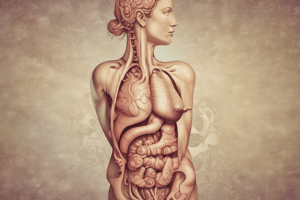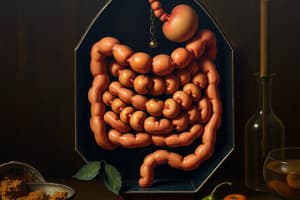Podcast
Questions and Answers
Which vitamin is specifically absorbed in the ileum?
Which vitamin is specifically absorbed in the ileum?
- Vitamin A
- Vitamin B12 (correct)
- Vitamin K
- Vitamin D
What condition can lead to malabsorption and result in steatorrhea?
What condition can lead to malabsorption and result in steatorrhea?
- Hypertension
- Iron Deficiency Anemia
- Celiac Disease (correct)
- Chronic Fatigue Syndrome
Which of the following medications is a folate antagonist and may require supplementation?
Which of the following medications is a folate antagonist and may require supplementation?
- Warfarin
- Corticosteroids
- Methotrexate (correct)
- Mesalamine
Which micronutrient deficiency is common among patients using corticosteroids?
Which micronutrient deficiency is common among patients using corticosteroids?
Which medication is known to interact with calcium-rich foods, reducing its effectiveness?
Which medication is known to interact with calcium-rich foods, reducing its effectiveness?
What condition occurs when the body struggles to absorb nutrients properly after surgery?
What condition occurs when the body struggles to absorb nutrients properly after surgery?
Which dietary approach may assist in managing symptoms of Small Intestine Bacterial Overgrowth (SIBO)?
Which dietary approach may assist in managing symptoms of Small Intestine Bacterial Overgrowth (SIBO)?
What type of medication may need adjustment based on absorption issues in Short Bowel Syndrome?
What type of medication may need adjustment based on absorption issues in Short Bowel Syndrome?
What is the consequence of excessive bacteria in the small intestine due to SIBO?
What is the consequence of excessive bacteria in the small intestine due to SIBO?
Which nutrient deficiency can occur as a result of Short Bowel Syndrome?
Which nutrient deficiency can occur as a result of Short Bowel Syndrome?
What condition is characterized by inflammation of the colon, causing pain and infection?
What condition is characterized by inflammation of the colon, causing pain and infection?
Which is a recommended dietary component for individuals with Short Bowel Syndrome?
Which is a recommended dietary component for individuals with Short Bowel Syndrome?
What does insufficient intestine length lead to in patients with Short Bowel Syndrome?
What does insufficient intestine length lead to in patients with Short Bowel Syndrome?
What is the formula for calculating Body Mass Index (BMI)?
What is the formula for calculating Body Mass Index (BMI)?
Which of the following correctly converts pounds to kilograms?
Which of the following correctly converts pounds to kilograms?
What condition is indicated by a weight loss of more than 2% in one week?
What condition is indicated by a weight loss of more than 2% in one week?
Which of the following correctly describes a sphincter's role in the GI tract?
Which of the following correctly describes a sphincter's role in the GI tract?
Which parts constitute the upper GI tract?
Which parts constitute the upper GI tract?
Which of the following is NOT a key sphincter in the GI tract?
Which of the following is NOT a key sphincter in the GI tract?
What is the primary function of the Ileocecal Valve?
What is the primary function of the Ileocecal Valve?
Where are key nutrients such as vitamin B12 primarily absorbed?
Where are key nutrients such as vitamin B12 primarily absorbed?
What is the minimum Mean Arterial Pressure (MAP) typically considered adequate for organ perfusion?
What is the minimum Mean Arterial Pressure (MAP) typically considered adequate for organ perfusion?
Which condition is primarily caused by H. pylori, NSAIDs, and stress?
Which condition is primarily caused by H. pylori, NSAIDs, and stress?
Which vitamin supplementation may be needed due to complications of gastrectomy?
Which vitamin supplementation may be needed due to complications of gastrectomy?
What type of diarrhea resolves with fasting?
What type of diarrhea resolves with fasting?
Which foods should be avoided on a low-fat diet?
Which foods should be avoided on a low-fat diet?
What are FODMAPs composed of?
What are FODMAPs composed of?
What is a common symptom of Celiac Disease?
What is a common symptom of Celiac Disease?
How is Irritable Bowel Syndrome (IBS) typically diagnosed?
How is Irritable Bowel Syndrome (IBS) typically diagnosed?
What nutritional issue may be indicated by low albumin levels in patients with Crohn's disease?
What nutritional issue may be indicated by low albumin levels in patients with Crohn's disease?
Which of the following foods are typically avoided in a FODMAP diet for managing IBS?
Which of the following foods are typically avoided in a FODMAP diet for managing IBS?
What type of nutritional supplement might be necessary for patients with Crohn's disease experiencing malabsorption?
What type of nutritional supplement might be necessary for patients with Crohn's disease experiencing malabsorption?
What is a potential effect of a high FODMAP diet on individuals with IBS?
What is a potential effect of a high FODMAP diet on individuals with IBS?
What is the role of mesalamine in the treatment of Crohn's disease?
What is the role of mesalamine in the treatment of Crohn's disease?
In the context of IBS, what is a primary characteristic of motility disorders?
In the context of IBS, what is a primary characteristic of motility disorders?
Which of the following is an intrinsic factor necessary for proper nutrient absorption in patients with certain conditions?
Which of the following is an intrinsic factor necessary for proper nutrient absorption in patients with certain conditions?
What dietary approach is suggested to manage IBS symptoms until the condition is more manageable?
What dietary approach is suggested to manage IBS symptoms until the condition is more manageable?
Flashcards are hidden until you start studying
Study Notes
Short Bowel Syndrome (SBS)
- Insufficient intestine length leads to malabsorption of nutrients
- Severe dehydration and nutrient deficiencies can occur after surgery
- Electrolyte and vitamin levels (B12) need monitoring.
- High-calorie, nutrient-dense foods are necessary
- Medications may need adjustment based on nutrient absorption issues
Small Intestinal Bacterial Overgrowth (SIBO)
- Excess bacteria in the small intestine disrupts digestion causing malabsorption
- Can cause malnutrition, weight loss, and low albumin and B12 levels
- Low-carb diets may help reduce symptoms
- Certain antibiotics can alter gut flora and affect absorption
Calculations
- Be able to calculate BMI and classifications
- Be able to calculate IBW, %IBW, and convert pounds to kilograms
- Be able to calculate % weight change and classifications
- Be able to calculate the Penn State Formula using kilograms and centimeters
- Convert pounds to kilograms (1 kg = 2.2 lb)
- Convert inches to centimeters (1 inch = 2.54 centimeters)
- BMI = (Weight in kg) / (Height in meters)^2
Upper and Lower GI Tract Anatomy
- Sphincters are circular muscles regulating content flow through the GI tract
- Key sphincters include - Upper Esophageal Sphincter (UES), Lower Esophageal Sphincter (LES), Pyloric Sphincter, Ileocecal Valve, and Anal Sphincters
- Sphincters prevent backflow and control the movement of food and waste
Digestion
- Mechanical and chemical digestion starts in the mouth
- Ileum is the site of B12 absorption
- Malabsorption conditions like Celiac Disease and IBD can lead to issues like steatorrhea (fat in stool)
Medications with Food/Nutrient Interactions
- Mesalamine (Asacol): used for IBD, may interact with nutrients
- Corticosteroids: can increase appetite and affect glucose levels
- Methotrexate: folate antagonist, may require folate supplementation
- Common micronutrient deficiencies: Vitamin K, B12, Iron, Vitamin D, and Zinc
Medications that Alter Liver Enzymes
- Acetaminophen: overuse can lead to liver damage
- Statins: used for cholesterol management and can elevate liver enzymes
- Antiepileptics: Phenytoin and carbamazepine can affect liver function
- Antibiotics (e.g., tetracycline): can bind with calcium in dairy products
- Warfarin: interacts with vitamin K-rich foods affecting blood clotting
- Proton Pump Inhibitors (e.g., omeprazole): can hinder absorption of nutrients like vitamin B12 and iron
Lab Abnormalities
- Dehydration leads to elevated creatinine and electrolyte imbalances
- Metabolic stress can cause changes in glucose and electrolyte levels
- Medication effects can alter liver enzymes or kidney function, impacting lab results
Mean Arterial Pressure (MAP)
- Used to assess perfusion
- A MAP of 65 mmHg or higher is generally considered adequate for organ perfusion
Enteral Nutrition (EN)
- Initiated after hemodynamic stability is achieved, usually when a patient can tolerate oral intake.
Lower GI
- Peptic Ulcer Disease (PUD): can be caused by H. pylori, NSAIDs, and stress
- Nutrition for PUD focuses on avoiding irritants and promoting healing
- Gastrectomy (stomach removal) complications include malabsorption and nutrient deficiencies
- Supplementation with vitamins B12, iron, and calcium may be necessary after gastrectomy
- Two types of diarrhea: Osmotic (resolves with fasting) and Secretory (does not resolve with fasting)
- Nutritional consequences of diarrhea include dehydration and malnutrition
- Common causes of malabsorption include celiac disease and IBS
- Low-fat diets should avoid high-fat foods like butter and oils
- Celiac disease symptoms include diarrhea and weight loss
- Avoid gluten-containing foods (wheat, barley, rye)
- IBS symptoms include abdominal pain and bloating
- FODMAP diet restricts fermentable carbohydrates
- FODMAPs are Fermentable Oligosaccharides, Disaccharides, Monosaccharides, and Polyols
- FODMAP foods to avoid: Wheat, garlic, onions, dairy, certain fruits (like apples and pears), and sugar alcohols (like sorbitol)
Crohn's Disease
- Symptoms include diarrhea, nausea, vomiting, and cobble-stoning effect on the gut
- Can lead to low albumin, electrolyte imbalances, malabsorption, malnutrition and dehydration
- May need parenteral nutrition (PN) then enteral nutrition (EN)
- Mesalamine (Asacol): may need an artificial sweetener in steroid form as an alternative
Irritable Bowel Syndrome (IBS)
- Motility disorder causing constipation, diarrhea, or a mix of both
- Electrolyte imbalances are possible
- Following a FODMAP diet helps manage the condition
- FODMAP foods to avoid: Wheat, garlic, onions, dairy, certain fruits (like apples and pears), and sugar alcohols (like sorbitol)
Studying That Suits You
Use AI to generate personalized quizzes and flashcards to suit your learning preferences.




